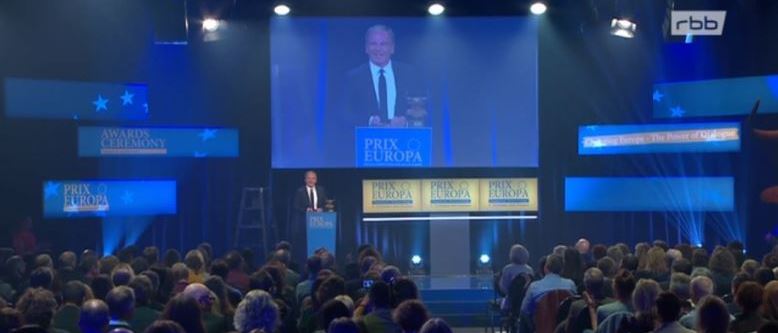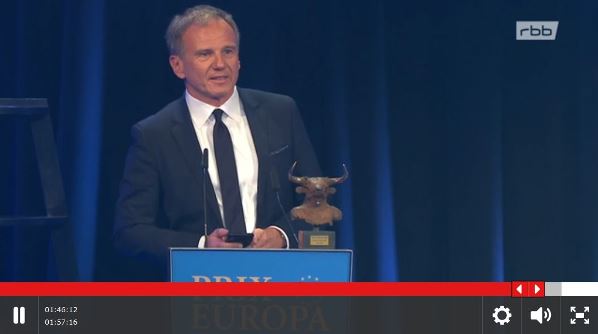Wow, was für eine Woche! Am Dienstag habe ich in Leipzig den „Preis für die Freiheit und Zukunft der Medien“ bekommen – und gestern Abend wurde ich in Potsdam als „Europäischer Journalist des Jahres 2019“ geehrt. Damit hatte ich – v.a. angesichts der großartigen, mit mir gemeinsam nominierten Kolleg*innen – wirklich nicht gerechnet.
„Das ist etwas, das nicht ohne Folgen bleiben kann“, hatte FPÖ-Generalsekretär Harald Vilimsky zu mir gesagt, als wir im April ein eher heftiges Interview miteinander hatten. Und Folgen hatte das Gespräch nun tatsächlich.
Beim Prix Europa werden in 15 verschiedenen Kategorien die besten Radio-, TV- und Online-Poduktionen des Jahres gekürt und eben ein*e „Journalist*in des Jahres“. Es gibt von der Preisverleihung gestern auch ein Video online (die Laudatio zum Journalisten des Jahres beginnt bei 1h36’45, meine kleine Dankesrede bei 1h45’00):
Und hier das Manuskript meiner Dankesworte:
I’m humbled to have been selected among so many brilliant journalists, all of whom would probably deserve this honor at least as much as I do.
Of course, this is the opportunity to thank everybody, from the jury to my colleagues, my kindergarten teacher and my grandmother – but first and foremost I want to thank a man without whom I would not be standing here tonight: Harald Vilimsky, the man, you just saw in the video.
In our interview you heard him say: “This cannot go without consequences”.
And consequences it had: Here I stand, receiving this wonderful award. I must admit, I’m quite proud. And a little bit ashamed that I owe this to Harald Vilimsky.
Of course, even if it appeared otherwise, Mr. Vilimsky didn’t lose it during our interview. The escalation on his part was totally calculated. And it was by far not the first time in the 17 years I have been interviewing politicians of his party.
The Freedom Party, like most populist movements, is not fond of traditional media, to say the least, and especially not of public broadcasters. They like to call us “redcasters” or “Rotfunk”. They think most journalists are left-wing radicals, PC-terrorists or in the pockets of “the system” and “the elite” and we’d never treat them fairly.
Of course, by assuming that serious media view them with scepticism, populists are not entirely wrong. I would even say there is in fact a fundamental antagonism between populist politics and serious journalism.
Serious journalists use facts and arguments to appeal to the reason and rationality of their audience, to provide the public with the factual basis for democratic discourse.
Populist politics – just as tabloid journalism – appeals first and foremost to the emotions of its audience. And, very often, to prejudice and resentment. Actually, you could even describe populism as tabloid politics.
Hence, populist parties and politicians apply different strategies in dealing with journalists. They try, for example, to exploit traditional media routines by using provocations and breaking political taboos – counting on our duty to report.
They try to circumvent professional journalists by creating their own media empires, mainly on social media.
Once in power, populists try to win control over influential media, as one can witness in Hungary in a frightening way, or as they aspired in Austria with the attempt to abolish the public broadcasting fee. “A media landscape like Viktor Orban has it” was one of the fantasies of Freedom Party chairman Heinz-Christian Strache in Ibiza, where he called journalists – I quote – “the biggest whores on the planet”.
This too, is a favorite strategy of populist parties: To attack journalists, personally or as a profession. “Lügenpresse” (“lying press”) is one of their favorite slogans here in Germany.
But nobody is more aggressive, extreme and cynical with his name-calling than the President of the most important democracy on earth. According to the Washington Post’s fact checkers, Donald Trump has made more than 12.000 false or misleading claims since he took office not even three years ago, an average of 13 per day. And every day he calls the journalists who report on his falsehoods and lies “fake and corrupt”, “degenerate haters”, “totally crazy and out of control”, “enemies of the people” and “the real opposition”.
The goal of this strategy is, of course, to discredit not only the journalists themselves but to delegitimize their work. It is a permanent attack on the very basis and the core of our profession, on the facts we report. The facts a democracy needs as the basis for reasonable public discourse. If you cannot tell truth from lies any more you cannot have a meaningful conversation.
And the strategy is working. According to a poll 82 per cent of republican voters in the U.S. trust Donald Trump more than the media. I find this extremely alarming.
Still, it’s not our job to react on the same level or by similar tactics. Nobody said it better than Martin Barron of the Washington Post: “We are not at war”, he says: “We are at work”.
I’m utterly convinced that this is the best answer we can give: To do our work, as professional, diligent, reliable and fair as we can. To explain to our audiences, how we work and why this is important. To be transparent about any mistakes we make. And to listen to our audience with an open mind.
The late Gerd Bacher, the longtime president of Austrian Public Broadcasting and a legendary journalist himself, once described our work as follows: “Journalism is differentiation. The differentiation between true and false. Between important and trivial. Between sense and nonsense.” The journalists who are gathered here tonight do this work every day – and I’m proud to be one of you.
Finally, I do want to say THANK YOU, of course: To my fabulous colleagues at ORF, especially at ZiB2, the show I’m privileged to present. I want to thank AGRA, the committee of elected representatives of all public broadcasting journalists in Germany who safeguard press freedom within their institutions and against outside pressure every day. Their work was never more important than today and I’m proud and grateful that AGRA suggested me for this award.
And most of all I want to thank my wife Euke, who is here with me tonight and who is always a bit envious of the people I interview and debate on TV. Because with them I usually stop after 8 or 10 minutes. Even with Mr. Vilimsky. Thank you all very much!
Unmittelbar vor der – sehr schönen – Zeremonie hat Jörg Wagner vom radioeins Medienmagazin noch ein Interview von mir über Journalistenpreise, meine Arbeit und über den ORF gemacht. Hier zum Nachsehen:
Sie sehen gerade einen Platzhalterinhalt von YouTube. Um auf den eigentlichen Inhalt zuzugreifen, klicken Sie auf die Schaltfläche unten. Bitte beachten Sie, dass dabei Daten an Drittanbieter weitergegeben werden.



